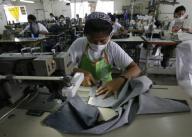LONDON/TOKYO (Reuters) – Soaring commodity costs are denting manufacturing activity in Asia and Europe and the outlook looks bleak as new orders drop off in the face of rising prices, surveys showed on Tuesday.
Manufacturing activity in the euro zone contracted in June for the first time in three years while business confidence in Asia’s largest export markets is buckling and output has likely contracted further in the United States.
Purchasing managers indices showed manufacturing activity in the euro zone fell to 49.2 in June, China saw its index fall to a near three-year low of 52.0 while in Britain it contracted at its sharpest rate since December 2001.
The 50.0 mark separates growth from contraction. Factories worldwide have struggled in the face of soaring raw material and energy costs — oil hit over $143 a barrel on Monday.
Meanwhile, the Bank of Japan’s tankan corporate index of big manufacturers’ sentiment dropped to plus 5, from 11 in March, showing their mood has not been darker since 2003.
The picture of slowing growth and spiralling prices applied to Britain too.
The UK’s manufacturing sector saw output and new orders fall at their fastest rate in almost a decade. But there was no let-up in inflationary pressures with input costs and output prices both rising at the fastest rate since the series began.
Even Japanese manufacturers, which have long struggled to pass on costs, pushed up prices in the last quarter, although not fast enough to offset a rise in costs and to keep profits growing, the tankan showed.
“That could indicate more inflationary pressures in the pipeline,” said Magnus Prim, chief Asia currency strategist at SEB in Singapore. “They’re getting squeezed on the profit side and see no alternative but to pass on price increases.”
The rally in commodity prices, driven in part by burgeoning demand from India and China, is feeding global inflation, threatening to push up low labour costs that for a decade helped keep a lid on prices.
The European Central Bank is widely expected to hike rates this week, despite a rapidly cooling economy, as it battles record inflation, whereas the Federal Reserve has slashed U.S. rates as it tries to stave off a prolonged recession.
The median of forecasts from economists is for U.S. manufacturing to have contracted for a fifth consecutive month in June, although some believe the slowdown is not severe enough to merit the recession tag.
The U.S. Institute for Supply Management’s index is due at 1400 GMT and forecast to dip to 48.6 in June from 49.6 in May.
To compound the gloom, unemployment has been rising although job losses in Spain, Italy and France were offset by a slight recovery in Germany, while lower demand in the UK saw firms laying off staff.
Germany offered a rare ray of light on Tuesday. Retail sales rose strongly in May after a weak April, while unemployment fell by a bigger-than-expected 38,000 in June to a near 16-year low of 3.266 million.
CHINA TROUBLE
China and India are battling their fastest inflation this decade.
Chinese firms warned they were passing rising costs on to consumers, which could hurt domestic demand, and struggling to export because of weak global markets, two PMI surveys showed.
The measure for input prices paid by China’s manufacturers rose to its highest since the PMI survey was launched in 2005. Domestic and export orders fell to their lowest since January.
A separately published PMI from brokerage CLSA showed output prices rose at their fastest pace in four years.
“The PMI shows a slowdown in orders and production in June. The question is how permanent this is. The businesses questioned suggested that it might be temporary,” said Eric Fishwick, CLSA’s head of economic research.
Slowing foreign demand for its goods has not stopped China exporting inflation, although it remains only a minor factor in the global surge in prices.
In India, purchasing managers were also worried about higher input costs. The ABN AMRO Bank PMI hit a seasonally adjusted 58.6 in June, its highest reading since February and up from a 10-month low of 57.4 in May.
But the survey’s input price index rose to a 19-month high and the rate of increase was the strongest since November 2006.
(Additional reporting by Saikat Chatterjee in Mumbai, Kevin Yao in Singapore, Zhou Xin in Beijing)
By Jonathan Cable and Hideyuki Sano
Tue Jul 1, 2008
Source: Reuters
